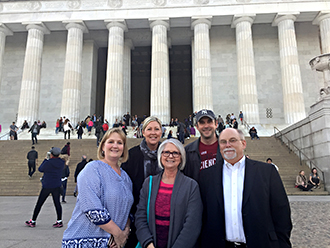PJC presents Mathways at national Pathways Institute
Published or Revised December 11, 2023

While attending the Pathways Institute in Washington, DC, faculty and staff from PJC stopped by the Lincoln Memorial. Shown from left are Associate Vice President of Student Access and Success Sheila Reece, President Dr. Pam Anglin, Communications Division Chair Rhonda Armstrong, Science Division Chair Jack Brown,and Vice President of Workforce Education John Spradling.
Paris Junior College continues to be a groundbreaking leader in the national Pathways project, as shown when PJC President Dr. Pam Anglin presented to a panel in Washington, DC, on how PJC was an early adapter and leader with the Mathways project. She was demonstrating to other colleges how to “scale” the Mathways success for their institutions.
This was the second in a series of five “Pathways Institutes” PJC will take part in as one of 30 participating institutions from around the nation. PJC found that data showed that too many college students were hitting a college algebra wall, preventing students from advancing. Only about one-third of PJC students were in degree plans needing algebra, but many students and advisors viewed it as the “safest” college level math course for transfer purposes.
“First we worked hard to gain buy-in from our math faculty,” said Dr. Anglin in her presentation, “they had to realize that not only were most of their students not math majors, the students perhaps did not like math as well as they did.”
From this, PJC revamped developmental education and now has multiple math options including Mathematics for Business & Economical Analysis I, Contemporary Mathematics - Quantitative Reasoning, and Elementary Statistical Methods, as well as keeping College Algebra but targeting only those who needed it. Thus Mathways has set up three ways to advance: algebraically-intensive, leading to careers in business and accounting, teaching and education, and science, technology, engineering and math (STEM); quantitative reasoning (Contemporary Math) for liberal arts, fine arts, and humanities; and Statistical Reasoning (Elementary Statistical Methods) for social sciences and services, and nursing and health professions.
PJC had worked with early research from the Texas Association of Community College’s Texas Success Center and with the University of Texas - Austin’s Dana Center as they developed Mathways in order to implement the project.
“The results are very encouraging,” said Dr. Anglin. “We have changed from three levels of developmental math to in most cases only one. College algebra is no longer keeping students from advancing because we are placing them in appropriate and applicable math pathways that support their degree plans. Math success rates have increased in all three paths.”
Mathways will be included in the Pathways project as it is implemented, allowing PJC to continue demonstrating to colleges nationwide how a small college can adapt and provide the types of structured learning that data shows will help students be more successful in reaching their educational and career goals. A final piece to the puzzle was seen recently as universities have come on board, agreeing to accept the different courses for transfer.
Also attending the Pathways Institute were Vice President of Workforce Education John Spradling, Associate Vice President for Student Access and Success Sheila Reece, Communications Division Chair Rhonda Armstrong, and Science Division Chair Jack Brown. Armstrong focused on faculty leadership for mapping programs, and restructuring the institution around meta-majors and communities of interest. Brown covered defining and aligning learning outcomes and using data as a lever for transformational pathways reform. Reece had aligning instruction and student services around Pathways and discerning unintentional barriers in Pathway design and implementation. Spradling focused on aligning programs of study with careers and employment and analyzing return on investment of Pathways implementation. In addition to her presentation on Mathways, Dr. Anglin also participated in a CEO Roundtable on prioritizing Pathways design and a session on redesigning developmental education as the on-ramp to programs of study.
National Pathways partners include AACC, Achieving the Dream, The Aspen Institute’s College Excellence Program, Center for Community College Student Engagement, Community College Research Center, Jobs for the Future, National Center for Inquiry & Improvement, and Public Agenda. It is supported by the Bill & Melinda Gates Foundation.
